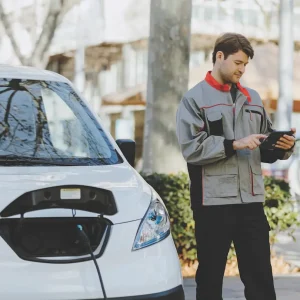Founded 187 years ago by a Victorian entrepreneur who built a small newsagent business into a national chain, Menzies Distribution is proud to say sustainability has always been at the heart of its business.
The company says the future depends on chosen business models and the small changes it can make today. Menzies strives to ensure its customers don’t have to compromise between people, profit or the planet.
The company introduced its electric fleet because it knows continuing to use fossil fuels is not sustainable. It says its priority is to expand it at pace – far ahead of regulatory deadlines. It was a pioneer in electric vehicle (EV) technology and the first organisation to introduce an electric fleet to the Scottish Highlands and Islands. For every EV it introduces, it is improving air quality, cutting particulates and reducing nitric oxide emissions.
To allow its fleet to make as many carbon neutral deliveries as possible, Menzies has established the largest commercial charging infrastructure in the UK and is working to broaden the wider charging ecosystem. Through extensive trials, it developed an energy efficient vehicle-to-grid (V2G) charging process – meaning it charges vans at off-peak times and returns spare charge to the grid at peak times.
With the remaining internal combustion-engined vehicles in its fleet, Menzies is taking measures to ensure every aspect is as sustainable as possible, such as choosing designs to make bodywork as aerodynamic as feasable. It claims the introduction of air deflectors has reduced vehicle drag by 30% and increased fuel efficiency by 10–15%.
Menzies’ fuel partner offers carbon offsetting initiatives including tree plantation schemes, avoided deforestation, and solar and wind power. The fuel itself has special additives to reduce harmful engine deposits. Its diesel fleet is Euro 6 compliant, meeting the lowest possible emissions limits, along with the criteria for Low and Ultra-Low Emissions Zones and Clean Air Zones. The company optimises routes to minimise miles driven and runs a driver monitoring and training programme to reduce emissions, increase efficiency and improve safety. Menzies includes dual-fuel LNG and CNG vehicles within its fleet. Across its operation Menzies has reduced its CO2 emissions by 5.8% over the past 12 months.
In addition Menzies uses clean wind and hydro power across its network, while its sites are internally lit with LED and externally with Passive Infrared lighting. In select depots, this switch saves over 90,000kg of CO2 per year, according to Menzies. Continued investment and energy efficiency measures have reduced CO2 per ft² of warehouse space by 61% over the past four years.
Menzies aims to cut its energy consumption by a further 20% through installing automatic temperature control, automatic power down on electrical items,LED motion sensors, economical roof insulation and suspended ceilings, power-saving boilers for hot water and heating and the installation of more solar panels.
Operating in the newsagent sector, which generates a great deal of recyclable material, Menzies has implemented a waste management strategy that sees it recover, bale and recycle 26,331t of material each year. Moreover, its returns sortation centre has recently passed the 14 million items mark, adding value to customers by providing a cost-effective rapid route to market for reuse and resale and reducing potential landfill waste.
Beyond its green initiatives, Menzies also defines sustainability as playing a role in supporting the communities where it operates.
It supports seven charities: Beatson Cancer Care, The Mater Foundation, Air Ambulance Kent, Surrey and Sussex, Wooden Spoon and The Jo Cox Foundation, as well as Mental Health UK and Transaid.
Highly Commended: Mitie

Mitie’s electric vehicle transition began in May 2019 when it took on its first EV. It has now grown this fleet to 1,703 EVs, the largest pure electric fleet in the UK, and has a further 834 on order. The EVs it currently has prevent 8,515 tonnes of CO2 from being emitted annually. As particulate emissions are generated through brake dust, tyres, and tailpipe emissions, transitioning to an EV reduces brake dust due to regenerative braking and eliminates tailpipe emissions. As for its internal combustion engine vans, Mitie has introduced Telematics Driver Behaviour LED Lightbars to reduce idling time, this has reduced diesel consumption by 75,000l, saving 195t of carbon in one year.


